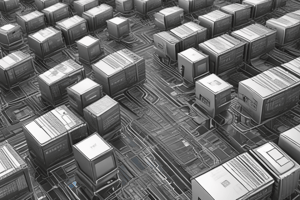Podcast
Questions and Answers
What is a characteristic of decentralized algorithms in distributed systems?
What is a characteristic of decentralized algorithms in distributed systems?
- The failure of one machine ruins the entire algorithm
- Machines make decisions based only on local information (correct)
- Machines make decisions based on global information
- The presence of a global clock is assumed
What is a pitfall to avoid when developing distributed systems?
What is a pitfall to avoid when developing distributed systems?
- The network is heterogeneous
- The topology changes frequently
- The network is reliable (correct)
- There is no administrator
What is a characteristic of Clustered Systems Architecture?
What is a characteristic of Clustered Systems Architecture?
- Homogeneous environment (correct)
- Not suitable for parallel programming
- Heterogeneous environment
- Each node runs a different OS
What is an example of a Distributed Computing System?
What is an example of a Distributed Computing System?
What is the main difference between Clustered Systems and Grid Computing Systems?
What is the main difference between Clustered Systems and Grid Computing Systems?
What is an advantage of Distributed Computing Systems?
What is an advantage of Distributed Computing Systems?
What is a key benefit of cloud computing in terms of security?
What is a key benefit of cloud computing in terms of security?
What is a characteristic of ubiquitous systems?
What is a characteristic of ubiquitous systems?
What is a key feature of cloud computing services?
What is a key feature of cloud computing services?
What is a characteristic of mobile devices in mobile computing?
What is a characteristic of mobile devices in mobile computing?
What is a key concept in distributed systems?
What is a key concept in distributed systems?
What is a key challenge in distributed system development?
What is a key challenge in distributed system development?
What is the primary function of middleware in a distributed system?
What is the primary function of middleware in a distributed system?
What is the main advantage of distributed systems in terms of scalability?
What is the main advantage of distributed systems in terms of scalability?
What is the primary goal of transparency in a distributed system?
What is the primary goal of transparency in a distributed system?
What is the characteristic of decentralized algorithms in a distributed system?
What is the characteristic of decentralized algorithms in a distributed system?
What is an example of a scalability limitation in a distributed system?
What is an example of a scalability limitation in a distributed system?
What is the pitfall of distributed system development related to security and privacy?
What is the pitfall of distributed system development related to security and privacy?
Study Notes
Characteristics of Cloud Computing
- Low risk of data loss due to centralization, but control over sensitive data is a concern
- Readily consumable services that are easy to adopt and ready-to-use
- Examples: Amazon EC2, Google App Engine, IBM Enterprise Data Center, MS Windows Azure, SUN Cloud Computing
Transaction Processing Systems (TPS)
- Role of a TP monitor in distributed systems
- Enterprise Application Integration
- Communication Middleware Models/Paradigm
- Distributed File Systems
- Remote Procedure Call (RPC)
- Distributed Objects (RMI)
- Distributed Documents
- Ubiquitous Systems
Ubiquitous Systems
- Networked, distributed, and accessible devices in a transparent manner
- Interaction between users and devices with context awareness
- Autonomous devices with high self-management
- Intelligent system handling dynamic actions and interactions
Mobile Computing
- Devices with changing location over time
- Implies discovery of local services, reachability, etc.
Pitfalls in Distributed Systems
- Assuming network reliability, security, homogeneity, and fixed topology
- Assuming zero latency, infinite bandwidth, and zero transport cost
- Assuming a single administrator
Types of Distributed Systems
- Distributed Computing Systems (High Performance Computing, HPC)
- Distributed Information Systems (Transaction Processing Systems, TPS, and Enterprise Application Integration, EAI)
- Distributed Pervasive Systems (Ubiquitous Systems)
Clustered Systems Architecture
- Collection of similar workstations/PCs connected by high-speed LAN
- Each node runs the same OS in a homogeneous environment
- Excellent for parallel programming
- Examples: Linux-based Beowulf clusters, MOSIX (from Hebrew University)
Grid Computing Systems
- Collection of computer resources from multiple parties and locations
- Users can share access to combined power
- Examples: EGEE - Enabling Grids for E-SciencE (Europe), Open Science Grid (USA)
Definition of a Distributed System
- Multiple connected CPUs working together
- A collection of independent/autonomous computers appearing as a single coherent system
- Computing element/node can be either hardware device or software process
- Examples: parallel machines, networked machines
Middleware
- Enables distributed parts of the same application to communicate
- Offers each application the same interface
- Middleware to distributed system = operating system to a computer
Design Goals of Distributed Systems
- Easily connect users/resources
- Exhibit distribution transparency
- Support openness
- Be scalable in size, geographically, and administratively
Advantages and Disadvantages
- Advantages: communication and resource sharing, economics, reliability, scalability, and potential for incremental growth
- Disadvantages: distribution-aware PLs, OSs and applications, network connectivity essential, security and privacy
Transparency in a Distributed System
- Access transparency: hide differences in data representation and access
- Location transparency: hide where a resource is located
- Migration transparency: hide that a resource may move to another location
- Relocation transparency: hide that a resource may be moved to another location while in use
- Replication transparency: hide that a resource may be shared by several competitive users
- Concurrency transparency: hide that a resource may be shared by several competitive users
- Failure transparency: hide the failure and recovery of a resource
- Persistence transparency: hide whether a resource is in memory or on disk
Studying That Suits You
Use AI to generate personalized quizzes and flashcards to suit your learning preferences.
Description
Test your understanding of distributed systems, including their definition, characteristics, and examples. Learn about the concept of multiple connected CPUs working together and autonomous computers that appear as a single coherent system.




